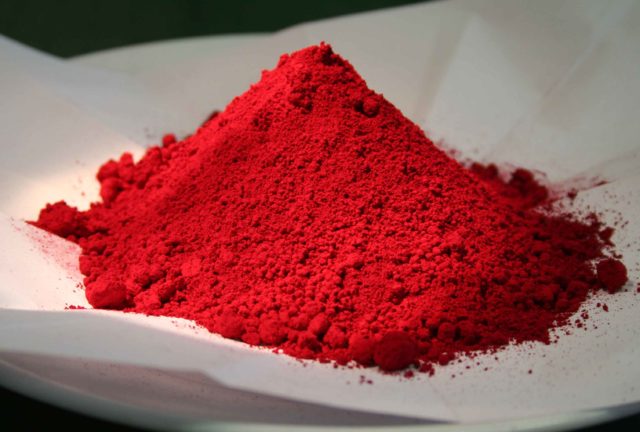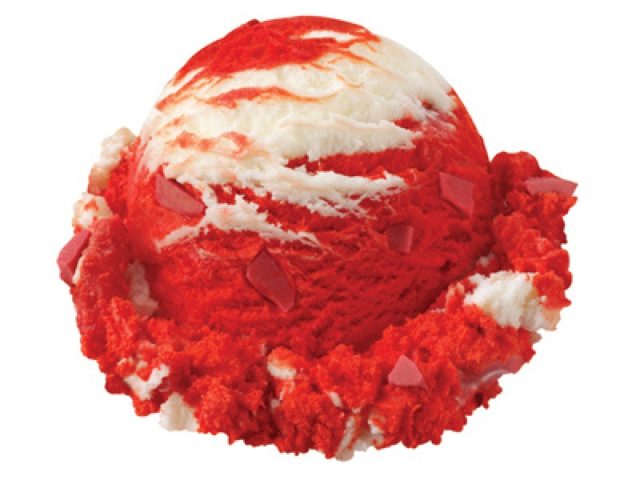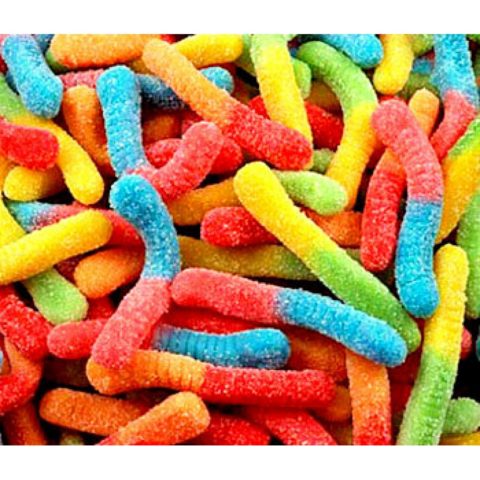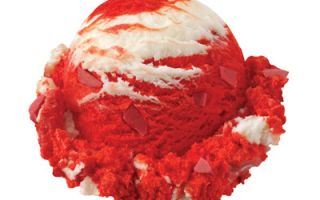Content
Food additive E124 is an artificial dye. Its other name is Ponceau 4R. The substance is characterized by a bright purple color. It is used to brighten many foods. The additive is officially recognized as a carcinogen in many countries, it can cause allergies in especially sensitive people and young children. However, it is allowed in Russia, some European and Asian countries, and Australia. In addition to the food industry, the dye is used in the production of textiles, detergents, cosmetic and pharmaceutical products.
What kind of additive is E124

The food additive is a dye of artificial origin, has a bright crimson hue. The name comes from the French word Ponceau, which means poppy red. With its help, you can achieve other, no less bright colors, adding in different proportions.
In Russia, a food additive can be specified under other names:
- ponceau (4R);
- cochineal red;
- crimson (4R).
In terms of chemical and physical characteristics, the food additive is sodium salt. It is a crimson powder or granules that dissolve well in water. The substance is very thermally stable, not exposed to high temperatures, light, and various chemicals. Has no pronounced odor. The additive can lose its rich color only when exposed to ascorbic acid. After adding E124 to food products, they can be exposed to low temperatures, the process of sterilization, pasteurization, this will not affect the color.
What is Ponceau 4R dye made of?
Sodium salt, which is a food additive, is produced under laboratory conditions from aromatic hydrocarbons. The largest producers of E124 are considered a number of domestic companies. Abroad, the leading position in the production of additives belongs to ABF (USA) and Kerry Ingredients Flavors (Ireland).
E124 dye, harmful or not
The food additive can cause significant harm to human health. Overuse causes:
- severe allergic reactions;
- asthmatic manifestations;
- rashes on the skin;
- anaphylactic shock.

This additive is prohibited from use in some countries. For example, in the USA and Finland, it was considered necessary to stop using the E124 additive. As for Russia and European countries, despite all the studies that confirm the harmful effect of the food additive E124 on the body, it continues to be actively added to food. A number of laboratory studies in animals have shown that there is a direct link between supplementation and tumor formation.
In 2009, the European Food Safety Agency strongly recommended that the allowable daily intake of the dietary supplement be reduced from 4 mg to 0.7 mg per kg of body weight. However, many food companies continue to use an increased dose.
Dangerous or not food additive E124
Not so long ago, the published conclusions of British scientists indicate that the E124 dye is related to the most dangerous food additives, since it is considered a carcinogen. According to experts from the World Health Organization, carcinogens are any agents that, by chemical and physical properties, can cause the development of irreversible processes in human organs and tissues. They are able to change the genetic apparatus, gradually accumulating in cells.
Where and why is ponso 4R dye added?
Almost all of the produced mass of crimson dye ponceau E124 goes to the needs of the food industry. The additive is used for the manufacture of the following food products:
- meat products - sausages and sausages;
- fish products - in salted and smoked fish;
- some bakery products;
- ice cream;
- cakes, biscuits, desserts;
- jams, preserves;
- drinks.

To these products, E124 imparts a bright color that is more attractive than the natural shade and also extends the shelf life. In the pharmaceutical industry, the additive is used for coloring drugs in tablets, syrups. Some types of fabrics are dyed with this substance. The food additive is also actively used to give a beautiful shade to hygiene products: shampoos, gels, balms and masks. E124 is present in almost all decorative cosmetics, especially in lipsticks and eyeshadows.
Despite the obvious harm to the body from a synthetic additive, manufacturers in a number of countries are not going to give up a cheap and at the same time effective coloring agent. Taking advantage of the fact that E124 is not prohibited from being added to food, manufacturers use it for those products that children often consume - ice cream, carbonated drinks, sweets and other sweets.
Conclusion
Food additive E124 refers to dyes that are artificially obtained in laboratory conditions. The substance is actively used in the food industry to give an attractive shade to food products that have lost their presentation after heat treatment. Despite the ongoing debate about the dangers of the additive, there are no plans to ban it in Russia and a number of European countries. However, its carcinogenic properties have long been proven by competent authorities.

